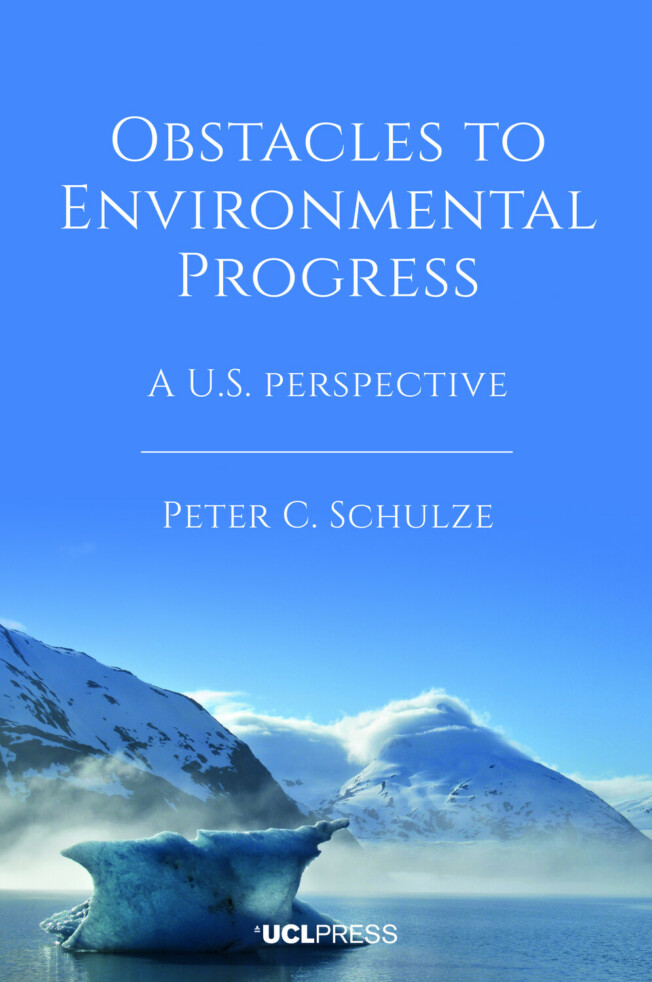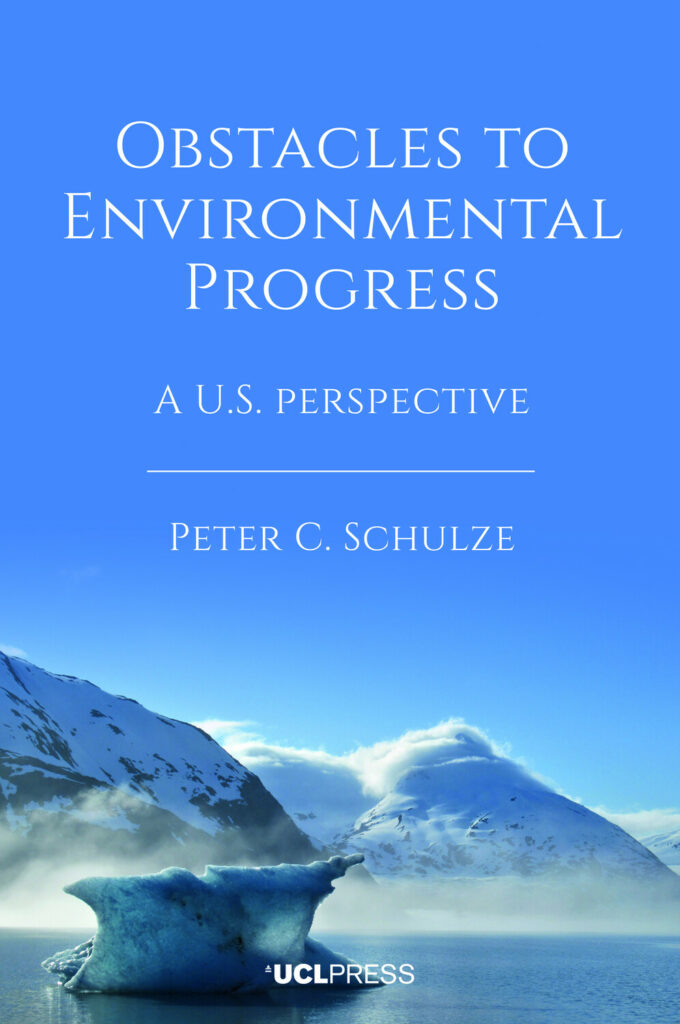
Obstacles to Environmental Progress
A U.S. perspective
Peter C. Schulze (Author)
Why, when so many people understand the severity of environmental problems, is progress so slow and sustainability such a distant goal? What gets in the way? Perhaps you have immediately thought of several barriers. In Obstacles to Environmental Progress, Peter Schulze identifies 18 practical obstacles that routinely and predictably hinder U.S. progress on existing environmental problems. The obstacles apply to problems small and large and, in most cases, regardless of whether an issue is controversial. Though the book focuses on the U.S., most of the obstacles pertain elsewhere as well.
The obstacles fall into three categories: challenges to anticipating, detecting, and understanding problems; political and economic factors that interfere with responding; and obstacles to effective responses. While all the obstacles are predictable and common, they have not been systematically studied as related phenomena, perhaps because they span a wide range of academic disciplines.
In practice, they often arise as surprises that are then addressed in an ad hoc manner. Might they be better understood and thus more readily anticipated and overcome or avoided?
The book seeks to hasten environmental progress by forewarning and thus forearming those who are striving or will soon be striving for environmental progress, and by drawing scholarly attention to the obstacles as a set of related phenomena to systematically understand and more quickly overcome.
Praise for Obstacles to Environmental Progress
‘I have never come across another book that gives students such an accessible and helpful guide to the broad scope of the challenges facing an environmentally sound and sustainable future.’
Al Wurth, Lehigh University
‘We’ve long needed something like this: a gazetteer for answering the endless series of objections and overcoming the repetitive obstacles that stand between us and the environmental progress we urgently require.’
Bill McKibben, author of The End of Nature and founder of 350.org and Third Act
‘This deeply thoughtful, open-access volume is easy to read but profoundly disturbing and only slightly encouraging, a book to energize the environmental movement.’
CHOICE Connect
‘“We have a serious problem,” writes Peter Schulze at the beginning of his book,Obstacles to Environmental Progress. “We are beyond the carrying capacity of the planet.” What this means is that the way we are going on now cannot continue: it is unsustainable. Humanity’s actions are reducing the planet’s potential to support life and, the longer we carry on as is, the worse it gets for posterity. Something needs to be done.’
Conservation Biology
‘Schulze’s book is a valuable resource for all scientists, and it would be a mistake to limit its use to environmental scientists and policymakers.’
Metascience
List of figures
List of tables and boxes
List of abbreviations
Preface
Acknowledgments
1 Introduction
PART I Obstacles to detecting and understanding environmental problems
2 No one on watch
3 Detection challenges
4 Limits on experiments
5 Probabilistic reasoning
6 Inference and extrapolation
7 Scientific errors
PART II Obstacles to responding to environmental problems
8 Exaggerated impressions of scientific uncertainty
9 One-sided perspectives on liberty
10 Market freedom
11 Paying for protection
12 Perceived lack of urgency
13 Flawed democracy
14 An endless uphill battle
PART III Obstacles to effective responses
15 Devising effective responses
16 Compromises that doom responses
17 Mismatched or overlapping authority
18 Breakdown in policy implementation
19 Conflicts with other societal objectives
20 Recapitulation, reasons for optimism, and recommendations
Appendix: the six anti-environmental biases of cost-benefit analysis
References
Index
DOI: 10.14324/111.9781800082076
Number of illustrations: 36
Publication date: 22 August 2022
PDF ISBN: 9781800082076
EPUB ISBN: 9781800082106
Hardback ISBN: 9781800082090
Paperback ISBN: 9781800082083
Peter C. Schulze (Author)
Peter Schulze is Professor of Biology and Environmental Science at Austin College, Texas, where he directs the Center for Environmental Studies and Sneed Prairie Restoration. During his Center directorship, the school has been recognized as second nationally in renewable energy use per student, reduced its greenhouse gas emissions some sixty per cent and deemed a green college by Princeton Review. The prairie project received the 2020 Texas award for excellence in environmental education. Schulze was previously a fellow of the US National Academy of Engineering; he holds a PhD from Dartmouth College. Austin College, Harvard University and Texas Monthly magazine have recognized his teaching.
‘This deeply thoughtful, open-access volume is easy to read but profoundly disturbing and only slightly encouraging, a book to energize the environmental movement.’
CHOICE Connect
‘“We have a serious problem,” writes Peter Schulze at the beginning of his book,Obstacles to Environmental Progress. “We are beyond the carrying capacity of the planet.” What this means is that the way we are going on now cannot continue: it is unsustainable. Humanity’s actions are reducing the planet’s potential to support life and, the longer we carry on as is, the worse it gets for posterity. Something needs to be done.’
Conservation Biology
‘Schulze’s book is a valuable resource for all scientists, and it would be a mistake to limit its use to environmental scientists and policymakers.’
Metascience
‘We’ve long needed something like this: a gazetteer for answering the endless series of objections and overcoming the repetitive obstacles that stand between us and the environmental progress we urgently require.’
Bill McKibben, author of The End of Nature and founder of 350.org and Third Act
‘I have never come across another book that gives students such an accessible and helpful guide to the broad scope of the challenges facing an environmentally sound and sustainable future.’
Al Wurth, Lehigh University
Related titles
Participatory Planning for Climate Compatible Development in Maputo, Mozambique
Vanesa Castán Broto, Jonathan Ensor, Emily Boyd, Charlotte Allen, Carlos Seventine, Domingos Augusto Macucule, Christiana Figueres, UNFCCC Executive Secretary,
01 November 2015
Obstacles to Environmental Progress
A U.S. perspective
Why, when so many people understand the severity of environmental problems, is progress so slow and sustainability such a distant goal? What gets in the way? Perhaps you have immediately thought of several barriers. In Obstacles to Environmental Progress, Peter Schulze identifies 18 practical obstacles that routinely and predictably hinder U.S. progress on existing environmental problems. The obstacles apply to problems small and large and, in most cases, regardless of whether an issue is controversial. Though the book focuses on the U.S., most of the obstacles pertain elsewhere as well.
The obstacles fall into three categories: challenges to anticipating, detecting, and understanding problems; political and economic factors that interfere with responding; and obstacles to effective responses. While all the obstacles are predictable and common, they have not been systematically studied as related phenomena, perhaps because they span a wide range of academic disciplines.
In practice, they often arise as surprises that are then addressed in an ad hoc manner. Might they be better understood and thus more readily anticipated and overcome or avoided?
The book seeks to hasten environmental progress by forewarning and thus forearming those who are striving or will soon be striving for environmental progress, and by drawing scholarly attention to the obstacles as a set of related phenomena to systematically understand and more quickly overcome.
Praise for Obstacles to Environmental Progress
‘I have never come across another book that gives students such an accessible and helpful guide to the broad scope of the challenges facing an environmentally sound and sustainable future.’
Al Wurth, Lehigh University
‘We’ve long needed something like this: a gazetteer for answering the endless series of objections and overcoming the repetitive obstacles that stand between us and the environmental progress we urgently require.’
Bill McKibben, author of The End of Nature and founder of 350.org and Third Act
‘This deeply thoughtful, open-access volume is easy to read but profoundly disturbing and only slightly encouraging, a book to energize the environmental movement.’
CHOICE Connect
‘“We have a serious problem,” writes Peter Schulze at the beginning of his book,Obstacles to Environmental Progress. “We are beyond the carrying capacity of the planet.” What this means is that the way we are going on now cannot continue: it is unsustainable. Humanity’s actions are reducing the planet’s potential to support life and, the longer we carry on as is, the worse it gets for posterity. Something needs to be done.’
Conservation Biology
‘Schulze’s book is a valuable resource for all scientists, and it would be a mistake to limit its use to environmental scientists and policymakers.’
Metascience
‘This deeply thoughtful, open-access volume is easy to read but profoundly disturbing and only slightly encouraging, a book to energize the environmental movement.’
CHOICE Connect
‘“We have a serious problem,” writes Peter Schulze at the beginning of his book,Obstacles to Environmental Progress. “We are beyond the carrying capacity of the planet.” What this means is that the way we are going on now cannot continue: it is unsustainable. Humanity’s actions are reducing the planet’s potential to support life and, the longer we carry on as is, the worse it gets for posterity. Something needs to be done.’
Conservation Biology
‘Schulze’s book is a valuable resource for all scientists, and it would be a mistake to limit its use to environmental scientists and policymakers.’
Metascience
‘We’ve long needed something like this: a gazetteer for answering the endless series of objections and overcoming the repetitive obstacles that stand between us and the environmental progress we urgently require.’
Bill McKibben, author of The End of Nature and founder of 350.org and Third Act
‘I have never come across another book that gives students such an accessible and helpful guide to the broad scope of the challenges facing an environmentally sound and sustainable future.’
Al Wurth, Lehigh University

